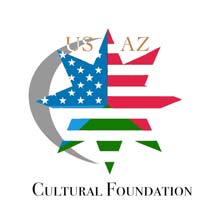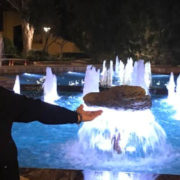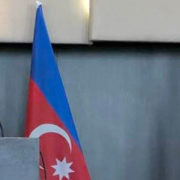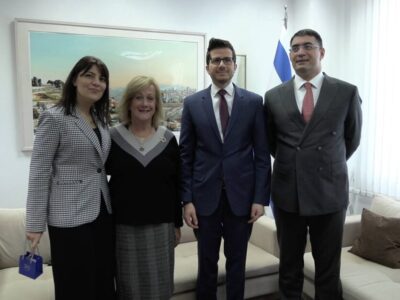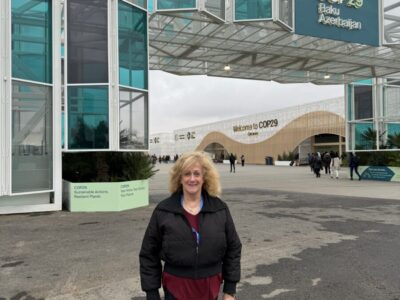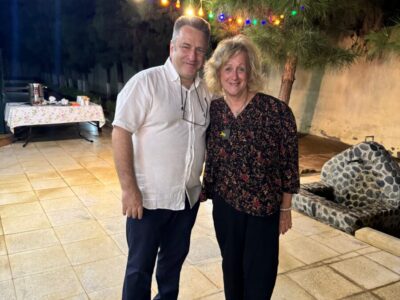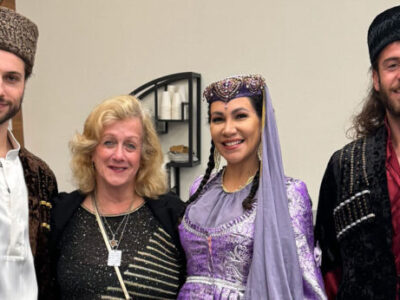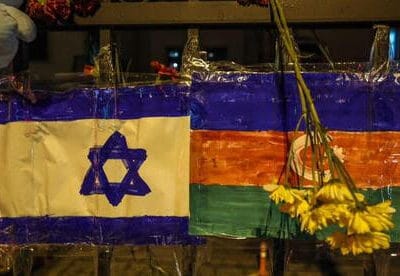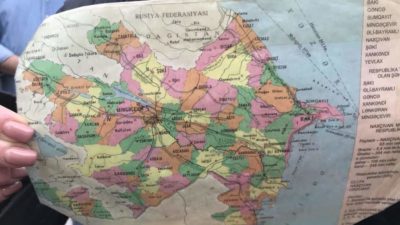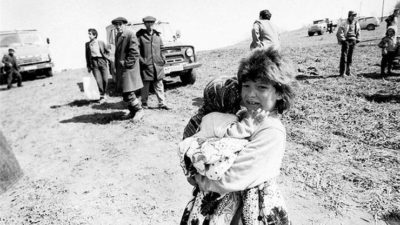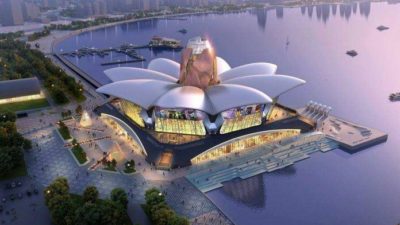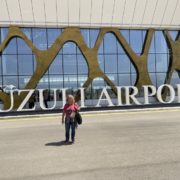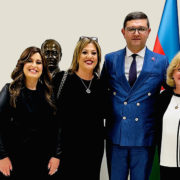Azerbaijanis have a double pride; the pride in the local Azerbaijani Jewish population and their country’s relationship with the State of Israel for the past 30 years. This pride was doubled recently when, on November 26, 2022, the President of Azerbaijan, Ilham Aliyev, approved the November 18 parliamentary resolution to open an embassy in Israel.
The bilateral relations Israel and Azerbaijani have held for 30 years is no secret. What was missing was an equal exchange of embassies and ambassadors. Israel has had a diplomatic envoy in Azerbaijan since 1992, Azerbaijan did not reciprocate. But that is all about to change.
The sovereign decision of Azerbaijan that was passed was respectfully reciprocated by the sovereign acceptance of the State of Israel. Another landmark in the expanding relations between the two countries.
Azerbaijan will be the first Shiite Muslim country to open its embassy in Israel. Mr. Mukhtar Mammadov, Deputy Minister of Science and Education, is already appointed as the country’s first ambassador to the Jewish state, Israel.
Azerbaijan, Israel’s Eyes on Iran
Azerbaijan is Israel’s near and far sight on Iran.
The entire world knows that Iran’s ultimate goal is to take Israel off the world’s map. The mullahs in Iran have been saying so frequently. The Mullahs in Iran address Israel as the ‘Small Satan’ and the United States as the ‘Big Satan’ on the world’s stage.
The southern border of Azerbaijan borders Iran. A considerable number of Azerbaijanis live in northern Iran
Azerbaijanis are Iran’s largest ethnic minority, and according to some estimates, up to 20 million ethnic-Azerbaijanis live in Iran, almost one-quarter of the entire population; they make up 25% of Iran’s population. Some address Northern Iran as South Azerbaijan.

When considering Iran’s proximity to Azerbaijan, strategy plays an extremely important role and has dramatic significance.
The fact that Israel receives admiration in the Azerbaijani public opinion only contributes to the importance of the strategic and several other general factors that exist between the two countries.
The fact that there has never been Antisemitism in Azerbaijan and the Azerbaijani people have always had great respect for the local Jewish community, which has always been an integral part of Azerbaijani society, does not disappear from sight.
As expected, Iran does not favor the relationship between Jerusalem and Baku. Azerbaijan’s security services are always on guard because in the past they had to thwart attempts to attack Israeli targets in their country, including a threat to kill the current Israeli ambassador to Azerbaijan, Mr. George Deek.
On July 21, 2022 Iran’s Ambassador to Azerbaijan, Abbas Mousavi, threatened Mr. Deek by suggesting that he would be “buried” by the people of Tabriz, Iran’s largest Azeri-majority city. “Our beloved Tabriz is known as the land of FIRSTS in Iran’s proud history. Apparently, the FIRST Evil Zionist is going to be buried by the zealous people of Tabriz, too,” Abbas Mousavi wrote in a tweet that day.

Mousavi’s tweet was a response to Ambassador Deek’s photo reading the book ‘Magic Tales of Tabriz’ about which he wrote that the book was teaching him “so much about Azerbaijani history and culture in Tabriz.”
It is worth noting that during September 2022, Iran conducted military exercises near its border with Azerbaijan. Then-Iranian Foreign Ministry spokesman Saeed Khatibzadeh said that his country “will not tolerate the presence of the Zionist regime near our border” referring to the close ties between the two countries.
There is no doubt that one of Azerbaijan’s security forces main tasks is to provide security throughout the country for its citizens, the diplomatic community and guests and they take all the necessary steps in connection with this issue.
It was not the first time that Iran attempted to drive a wedge between Azerbaijan and Israel and in this particular case Israel’s Ambassador Mr. Deek replied: “Iran will not be able to hinder Israeli-Azerbaijani relations.”

Characteristic Exchange Between the Two Countries
According to the United Nations COMTRADE database on international trade, during 2021 Azerbaijan crude oil export to Israel stood at US$887.54 million. That translates to Azerbaijan supplying up to 40% of the oil Israel buys.
Israel is considered to be one of Azerbaijan’s main arms suppliers. Some say that these sophisticated weapons contributed greatly to the victory in the 2020 Second Nagorno-Karabakh War against Armenia.
My visits to Azerbaijan taught me that the Azerbaijani people greatly respect and empathize with the Jewish people. After the Second Nagorno-Karabakh War, Israel made headlines as one of the heroes of this country’s victory. The Israeli flag was proudly hoisted in the windows of Azerbaijani houses and the residents of the country marched through the streets wrapped in the flag of their country, the flag of Israel, as well as the flags of Turkey and Pakistan.

The Jewish community in Azerbaijan is unique and this fact stands out to the eye of visitors to the country.
Azerbaijani-Jews played and play an integral part in the population’s social fabric. They are teachers, doctors, scientists, judges, artists, etc.
In the Nagorno-Karabakh wars – the First and Second – Jews born in Azerbaijan fought to defend their homeland.
Albert Agarunov, an Azerbaijani-Jew was a tank commander in the First Karabakh War. Albert became famous with an interview with ANS TV in which he was asked, “You are a Jew, why are you fighting here?” And the brave patriotic Azerbaijani-Jewish soldier answered in his native Azeri language: “I live in this country. I was born here and I live here. Nothing than these forces me to defend Azerbaijan. [My civic duty] is to come and defend this country. And I will stay here till the end of the war.”

Albert Agarunov was born in Azerbaijan into a Jewish family living in the village of Amirjan in the suburbs of Baku. He served as a tank commander, from 1987-1989, in the Soviet army, when Azerbaijan was part of the USSR. When the Soviet Union collapsed in 1991, Agarunov voluntarily joined Azerbaijan’s armed forces and was promoted to tank commander during the First Nagorno-Karabakh War.
During battle in 1991, Agarunov, along with Agababa Huseynov, eliminated nine Armenian tanks and two armored trucks and using his own style of attack, known by his comrades as the “Jewish Sandwich,” Agarunov destroyed two more tanks in 1992.
Due to his successes against Armenian forces, the Armenians put a price on Agarunov’s capture, reportedly offering five million Russian rubles.
On May 8, 1992, when Shusha was being occupied by Armenia, Agarunov was killed by sniper fire while he was trying to move the bodies of his dead fellow soldiers from the battlefield.
Agarunov was buried in the Alley of Martyrs in Baku’s Highland Park, and posthumously, in June 1992, he was awarded the title National Hero of Azerbaijan. In 2016, President Ilham Aliyev awarded him the Hazi Aslanov Medal named after Azerbaijani major-general of the Soviet armoured troops during World War II. A monument in his memory is erected in the National Pantheon of Azerbaijan.
The people who claim or define the relations of Azerbaijan and Israel as normalization are wrong. There has never been a conflict between the two countries so there is nothing to normalize.
Celebrating 30 Years of Warm Relations
Israel was one of the first countries in the world to recognize Azerbaijan’s independence, on August 30, 1991, after the country broke away from the Soviet Union.
On December 25, 1991, Israel formally recognized the independence of Azerbaijan and established diplomatic relations with the country on April 7, 1992.
In January 2023 Israel’s newly nominated Minister of Foreign Affairs Mr. Eli Cohen and Mr. Jeyhun Bayramov, Azerbaijan Minister of Foreign Affairs exchanged warm greetings after the announcement of the opening of the Azerbaijan embassy in Israel. Formal visits to each country by both countries’ parliamentary ministers, perhaps even the countries’ leaders themselves, would be most welcome.
It was reported that Minister Cohen told Minister Bayramov that Azerbaijan is a close friend and an important regional strategic anchor and that his country is highly valued in Israel in all respectful aspects. Even more so, the interfaith tolerance that exists in Azerbaijan and the existence of an ancient Jewish community in the country is like the cherry on top of the relations.
Several years ago I wrote an op-ed, “Azerbaijan: Regional Force of Stability & Connectivity.

What Should Be Expected?
Now that the countries’ bilateral relations are based on full ambassadorial representation, one could expect to see the potential of the relations between Azerbaijan and Israel growing enormously.
Although Azerbaijan and Israel are geographically distant – about a 3.5 hour flight time between the two countries – the ties are close. Trade between the countries is increasing and relations in many different areas are developing and expanding to include medicine, education, tourism, desalination of seawater and research.
Despite Everything In The UN, Azerbaijan’s Vote Is Not In Favor of Israel
Azerbaijan is a member of a number of international organizations such as the Organisation of Islamic Cooperation (OIC) and the Organization of Non-Aligned States with Israel. This tangle results in Azerbaijan voting against Israel in the UN. Azerbaijan cannot ignore or go against these organizations and their traditional position. But it should be noted that Azerbaijan was never part of the Arab-Muslim boycott or the embargo on Israel.
Azerbaijan and Improvement of relations Between Israel and Turkey
Relations between Azerbaijan and Turkey are extremely close and Azerbaijan has a desire to prioritize good relations between all her friends and partners. In Azerbaijan they believe that good relations between Israel and Turkey are a positive factor for their region. With the world’s instability, including in the South Caucasus Region, good and constructive relations between Israel and Turkey are important and a factor of stability. Therefore, Azerbaijan supports and has contributed to help the process of reconciliation and thawing relations between Israel and Turkey.

The Liberated Territory of Karabakh
In the center of the Karabakh territory is the city of Shusha, which was and will be the historical cultural center of Azerbaijan. The name of the city on the lips of the people of Azerbaijan sounds like a prayer.
Armenians captured the city in 1992, and in the last days of the Second Karabakh War, the Azerbaijanis liberated the city. That was a victory that gave the Azerbaijani soldiers an infusion of morale and renewed fighting power.

It is said that the battle for Shusha was a heroic event. It is said that the Azerbaijani soldiers were instructed not to use artillery and drones so as not to damage the historical buildings of the city. An Azerbaijani commando force of over 400 soldiers climbed by ropes one of the sides of the cliff on which the city is built, equipped only with knives and small arms. They surprised the Armenian soldiers who were waiting for them on the other side of the city. The face-to-face battles between the Armenian and Azerbaijani soldiers ended with the liberation of the city.
I visited the liberated area of Karabakh twice.
I had to see with my own eyes why the Azerbaijanis have such admiration for the Karabakh region and the city of Shusha. I remember the first time I flew into the newly opened Fuzuli airport of the city of Fuzuli, the capital of the Fuzuli District of Azerbaijan. From there I took a bus trip to Shusha. The second time I traveled by bus from Baku to Karabakh and returned to Baku on a different route.

The distance from Baku, the capital of Azerbaijan to Nagorno-Karabakh is approximately six hours drive, passing through the newly constructed Victory Road. As one drives through one can see rows of pictures of fallen-Shahid* Azerbaijani soldiers who fell in the battles to liberate Karabakh. (*though literally means “witness” in Qur’anic Arabic, shahid means “martyr” a term used in Islam for Muslims who died while fulfilling a religious commandment, including jihad.) Respect for those who gave their life to defend their homeland is sacrosanct to this nation.

For about 100 years, Armenia and Azerbaijan claimed ownership of Karabakh’s land.
The First Nagorno-Karabakh War took place from February 20, 1988 – May 12 1994, – 6 years, 2 months, 3 weeks and 1 day.
The full-scale fighting erupted in early 1992 and international mediators failed to bring an end resolution that both sides could work with. In early 1993, Armenian forces captured seven Azerbaijani-majority districts outside the Nagorno-Karabakh enclave, even threatening other countries in the region. By the end of the war, in 1994, Armenia was in full control of the Nagorno-Karabakh enclave and additional surrounding Azerbaijani territories, most notably the Lachin Corridor – a mountain pass that links Nagorno-Karabakh with mainland Armenia. A Russian-brokered ceasefire agreement was signed in May 1994.

In 1992, Azerbaijan was one-year-old when the Armenians, supported by Soviet Army units, occupied 20 percent of its territory.
The loss of Karabakh was a national trauma for Azerbaijan that lasted for about 30 years. The bloody war claimed the lives of over 30,000 Azerbaijanis and expelled one million more from their homeland who became Internally Displaced Refugees.
The Azerbaijanis did not sit idly by. Over the years after the loss of Karabakh they built a strong army. In the second Karabakh war that began in September 27, 2020 – November 10, 2020, now called the Patriotic War, which lasted 44 days, with the background support of Turkey and Israel, the Azerbaijani military bravely liberated about 95% of the occupied territory. Of course, the Russians immediately came to the defense of their Armenian allies and forced a cease-fire on the Azeris. The Russians are now acting as “peace keeping force.”
Nagorno-Karabakh is considered the Switzerland of the region due to its breathtaking scenery and weather. Unfortunately, Armenia turned the area into a pile of ruins; destroyed cemeteries, sold building blocks to Iranians, and turned mosques into stables. Armenia did not invest a single dollar in the development of the area it illegally occupied.
After the war ended, almost immediately Azerbaijan began rehabilitating Karabakh and is investing billions of dollars in building roads, three airports, railway system and residential villages.
Armenian separatists still hold 5% of the territory, connected to Armenia through the Lachin Corridor that is stretching over 60 kilometers and is secured by the Russian Peace Keeping Force of some 2000 soldiers.
Russians Are No “Peace Keepers.”
Azerbaijan accuses Russia of turning a blind eye to allow the transfer of military equipment from Armenia to the Armenian separatists in Karabakh, against the trilateral ceasefire agreement signed by the parties.
The 2020 Nagorno-Karabakh ceasefire agreement is an armistice agreement, signed on November 9, 2020 by the President of Azerbaijan Ilham Aliyev, the Prime Minister of Armenia Nikol Pashinyan and the President of Russia Vladimir Putin which ended all hostilities in the Nagorno-Karabakh region from November 10, 2020 Moscow time. The president of the self-declared Republic of Artsakh, Arayik Harutyunyan added his signature to the agreed end of the hostilities.
But hostilities continue regardless. Since December 12, 2022, the Azerbaijani Civil Society Eco-activists are protesting and waving Azerbaijani flags in front of the Russian soldiers, at the entrance to Shusha, which is adjacent to the “Lechin Corridor.” They claim that the Armenian separatists are illegally extricating, thus “robbing” gold and other minerals from the region, causing ecological damage.



According to the trilateral ceasefire agreement, the Armenians should withdraw their military forces that remain in Azerbaijan. Armenians who live in the region who want to remain living there must be loyal citizens of Azerbaijan and if not, they must evacuate the area.
As mentioned above, the Azerbaijanis are working hard to restore the neglected area. They invest billions of dollars in this recovery effort. They have already built two airports in the liberated area and now another airport is being built. They are paving hundreds of kilometers of highways and also renewing the railway system for the region. But, only when the Armenian side complies with the implementation of the ceasefire agreement, signed at the end of the war, will the direct relationship between Azerbaijan and Armenia be renewed.
The current problem is that, as can be seen, Armenia is stuck in a confrontational mentality. The Armenians think that the Azerbaijanis have a hidden agenda in their proposals, but the Azerbaijanis think that the peace proposal they offered to the Armenians is the best way for a permanent solution to the long conflict that is also good for the entire region.

Azerbaijan Offered Normalization To Armenia
The Azerbaijanis offered Armenia normalization, establishing ties, and opening roads. Given that Armenia is close to bankruptcy, Azerbaijan’s peace proposal would help Armenia rebuild its economy and also its military at the same time.
Many years have been wasted on this conflict and the existence of the key problem – war – is no longer valid. And hence there is a good basis to continue the process of normalization, leading the real peace.
It is true that Russia leads one normalization dialogue channel and the European Union leads another channel and there are other channels. The main problem is that Armenia has not yet ended its confrontational mentality.
Iran also helps the Armenians, but in view of the wave of protests in Iran that do not stop, it can be assumed that the Iranian aid has no added value for the Armenians.
People in Azerbaijan believe that Armenia has no military power against Azerbaijan. The crisis was resolved because, with the exception of a very small area, military wise Armenia almost disappeared from Azerbaijan’s territory. Armenians do not have the military or demographic strength to fight in Azerbaijan and another war appears doubtful. Azerbaijan is gaining strength and the weakening Armenia will have to carefully and wisely consider its approach and sign a peace agreement with Azerbaijan that includes economic ties.
Liberating an area to which a country has territorial integrity is also a liberating factor for the nation’s psyche.
Now that Azerbaijan is less of a risk for international investments, it is seen as an attractive destination for tourism.
Azerbaijan’s Embassy in Israel is one more positive step in the right direction.
Once the landmines Armenia planted all over the Nagorno-Karabakh region are cleared, this breathtaking area could become a perfect tourist destination.
The purpose of the US-AZ Cultural Foundation is to serve as a contributor to increase relations between Azerbaijan and the United States, in particular, as well as Israel and the West, in general, via culture, dialogue, media, entertainment, film & documentary content.
As a first-hand witness to post war Azerbaijan, I see Azerbaijan becoming the stabilizing force and the leading nation in the region, which confirms what I predicted several years ago.
